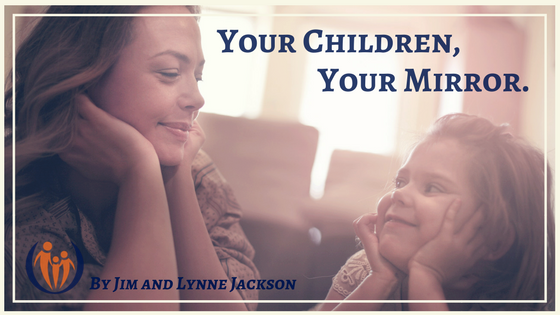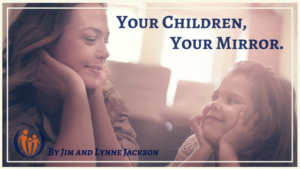
Your Children, Your Mirror

My dear brothers and sisters, take note of this: Everyone should be quick to listen, slow to speak and slow to become angry, because human anger does not produce the righteousness that God desires. James 1:19, 20
Primitive emotions are those that tend to put people in a “fight or flight” mode. Anger, frustration, anxiety, fear, and disgust are primitive emotions. When people feel one or more of these emotions, the people around them tend to quickly pick up on it and feel them too. This is called mirroring.
Think about it. When someone yells at you, they are frustrated or angry. Your brain immediately picks up this threatening vibe, and goes into action to respond. You feel angry or anxious as well. This can be helpful when we are literally under some fashion of physical attack because it helps us move quickly into a self-protective response by either escaping or confronting the threat.
As parents, however, this dynamic often contributes to escalating troubles with our kids.
Here’s how it often happens: Our kids get upset. We mirror them and get upset ourselves. They mirror us and get even more upset. And the snowball is rolling.
This is why we put such a premium on the parent’s responsibility to calm down before engaging with their upset children. We have yet to see a parent in fight or flight mode do anything to effectively reach their child’s heart. They may scare their kids into submission, which is not willing obedience, but scared compliance. Kid’s that are habitually scared into compliance grow up to be timid, anxious, and lacking confidence, or they become “angsty” and rebellious.
So today, if you’re feeling upset with your kids remember that they will likely mirror you. It is your responsibility to stop the growing snowball by taking a step back, taking a few deep breaths, and calming down so you can engage rationally and safely with your child. Now the mirroring will work to everyone’s advantage as your kids calm down also. Over time these responses can become stronger habits – for all of you. And you’ll probably find that you’re raising kids who can confidently navigate the complex world of human relationships.
Here are a few practical ideas to help you:
- Literally take a step back when your kids are upset (if they are not in danger).
- Consider your physical posture. Is it safe or is it threatening? Don’t engage until you have chosen a safe posture.
- Do the opposite of your impulse. If you feel like yelling, speak quietly. If you feel like scowling, remain neutral. If you feel like towering over your child, sit down or get down on eye level with them.
- Intentionally speak slowly, adding pauses. (Quick actions set off fight/flight reactions.) Say, “We’re both really mad right now. I’ll set the timer to remind us to talk in a little bit.”
Let us know how it goes.
Download our FREE in-depth ebook Helping Kids With Anger. It will provide thoughtful insights and creative ideas to help your struggling child.

